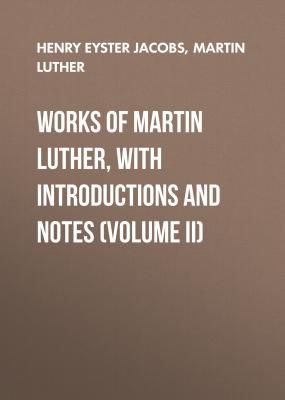Works of Martin Luther, with Introductions and Notes (Volume II). Martin Luther
Читать онлайн.| Название | Works of Martin Luther, with Introductions and Notes (Volume II) |
|---|---|
| Автор произведения | Martin Luther |
| Жанр | Философия |
| Серия | |
| Издательство | Философия |
| Год выпуска | 0 |
| isbn |
162
The oath of allegiance to the pope was required before the pallium could be bestowed (
163
See above, p. 86, note 2.
164
cf. Luther to Spalatin, June 25, 1520 (Enders, II, 424; Smith, No. 271).
165
i. e., The benefices are treated as though they were vacant.
166
In the case of certain endowed benefices the right to nominate the incumbent was vested in individuals, usually of the nobility, and was hereditary in their family, This is the so-called
167
168
A monk who deserted his monastery was known as an "apostate."
169
i. e., Offices which cannot be united in the hands of one man. See e. g., note 3, p. 91.
170
A gloss is a note explanatory of a word or passage of doubtful meaning. The glosses are the earliest form of commentary on the Bible. The glosses of the canon law are the more or less authoritative comments of the teachers, and date from the time when the study of the canon law became a part of the theological curriculum. Their aim is chiefly to show how the law applies to practical cases which may arise. The so-called
171
The thing which was bought was, of course, the dispensation, or permission to avail oneself of the gloss.
172
173
See above, p. 88, note 2. For a catalogue of papal appointments bestowed upon two "courtesans," Johannes Zink und Johannes Ingenwinkel, see Schulte,
174
See above, p. 87, note 1.
175
So Albrecht of Mainz bore the title of "administrator" of Halberstadt.
176
The name of this practice was "regression" (
177
The complaint was made at Worms (1521) that it was impossible for a German to secure a clear title to a benefice at Rome unless he applied for it in the name of an Italian, to whom he was obliged to pay a percentage of the income, a yearly pension, for a fixed sum of money for the use of his name (Wrede,
178
179
The
180
For a similar instance quoted at Worms (1521), see Wrede,
181
The three chief centers of foreign commerce in the XV and the early XVI Century. The annual fairs (
182
Built by Innocent VIII (1454-1490).
183
See above, p. 93, note 2.
184
The Church law forbade the taking of interest on loans of money.
185
During the Middle Ages all questions touching marriage and divorce, including, therefore, the question of the legitimacy of children, were governed by the laws of the Church, on the theory that marriage was a sacrament.
186
i. e., By buying dispensations.
187
The sums paid or special dispensations were so called.
188
The toll which the "robber-barons" of the Rhine levied upon merchants passing through their domains.
189
190
The Fuggers of Augsburg were the greatest of the German capitalists in the XVI Century. They were international bankers, "the Rothschilds of the XVI Century." Their control of large capital enabled them to advance large sums of money to the territorial rulers, who were in a chronic state of need. In return for these favors they received monopolistic concessions by which their capital was further increased. The spiritual, as well as the temporal lords, availed themselves regularly of the services of this accommodating firm. They were the pope's financial representatives in Germany. On their connection with the indulgence against which Luther protested, see Vol. I, p. 21; on their relations with the papacy, see Schulte,
191
Certificates entitling the holder to choose his own confessor and authorizing the confessor to absolve him from certain classes of "reserved" sins; referred to in the XCV Theses as
